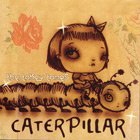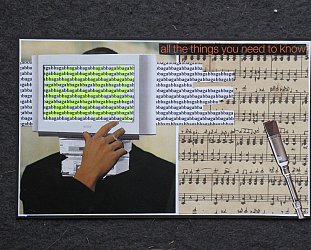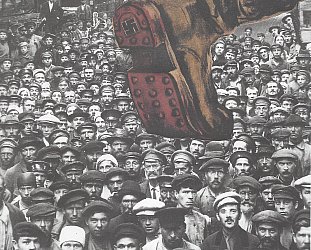Graham Reid | | 5 min read
Yoghurt and Vinegar (from Butterfly)

It’s a common occurrence: just when popular music has got up a head of steam, some supportive critical consensus, and is charging off in a particular direction along comes something which, by going the opposite way, captures the imagination.
At the height of Day-Glo acid-dropping hippiedom along came the Velvet Underground in all their monochrome gloominess singing about heroin and sadomasochism.
And when bellowing, plaid-shirt grunge gods were stomping the planet there were the Cowboy Junkies whispering their way into the foreground with songs recorded in a church for about the entry price to a Nirvana gig.
So it was in this country in mid 2003 when radio was crawling all over guitar bands like the Feelers and Tadpole.
In the previous two years these bands, and there were others like the already forgotten Breathe, were being hailed as evidence that Kiwi rock bands were able to foot it with their overseas counterparts.
Their successes were seen as a triumph for various funding bodies committed to getting more “New Zealand on air”, the bands were popular and even making a buck, and radio could congratulate itself that it was supporting “Kiwi music“, a phrase which to me increasingly had the ring of “commercially acceptable international-sounding guitar pop“ about it.
It seemed pretty proscriptive because New Zealand music at its best -- from Split Enz through The Verlaines to the Brunettes at the time of this writing -- has always been about something slightly angular and off-centre.
And amidst the racket of all that pop-rock and backs of radio programmers being slapped came the Tokey Tones, swimming against the current.
They were quiet, crafted, poetic and charming -- and drowned out by the surface noise elsewhere.
But they did have a willing audience and -- in their simultaneously released Caterpillar and Butterfly albums -- two calling cards which announced the arrival of a major talent.
On a chilly night in July 2003, the Tokey Tones launched their albums with a gig at the tiny Odeon Lounge on Mt Eden Rd, a former funeral parlour where my Dad once lay.
It was an extraordinary night as half a dozen Tokey Tones -- more a concept than a band, it seemed -- took to the cramped stage, a three-piece string section seated in front of them, and let their magical sound waft through the air.
They won the audience by the oldest trick in the book, understatement. People listen more carefully if you speak quietly.
A week later I met up with Scott Mannion who is, for all practical purposes, the Tokey Tones.
Slight of frame, shy, modest and nervous, with a beanie pulled down tight, he looked exactly the kind of person who would be behind the Tokey Tones’ delicate music.
He wrote almost all of the Caterpillar/Butterfly songs, and produced the albums. When we met at the old Occidental Hotel -- a pub favoured by journalists and the Flying Nun crowd whose offices were around the corner -- he seemed genuinely surprised someone from the biggest newspaper in the country would want to talk with him.
But why would we not ?
Caterpillar and Butterfly -- with cover art by Misery, now a high profile industry but then a little known artist -- were, and remain, beguiling pieces of work which betray an acute musical sensibility.
With deft and subtle instrumentation -- simple basslines, Pasifika guitars and ukulele, scraping and mournful strings, simple keyboards, maybe a kazoo here and there, and a morepork on one track -- the music has a sense of poise and space.
It also refers to a great swathe of music history (from Bacharach and the pop minimalism of Young Marble Giants, to the eccentric work of Vic Chestnutt and exotica lounge music) and there is a keen pop sensibility at work: the swapped lines between Mannion and Heather Mansfield (of the Brunettes) on Love Done Me No Good; the memorably simple and cheery Je N’aime Pas; Li-Ming Hu’s childlike vocals throughout; the enveloping melodicism and melancholy of Glitter and Paste; the Rubber Soul-era Beatles pop of Yoghurt & Vinegar (which also neatly references the Beach Boys) . . .
Musically there is too much to assimilate in a quick listen, and therefore the albums are endlessly rewarding over time.
The music itself has a sense of wonder and discovery, reinforced by seductive, often elementally simple, lyrics. The final track on Caterpillar is Slippers and Sleep: “Slow it down/slow it down/you need your sleep tonight/close those eyes/close those eyes and/sleep now.”
Mannion writes of love with a sense of dejection and the knowledge that, marvellous though it is, the feeling is transitory. Just happy in a sad kind of way. On songs like Cinema he seems wise beyond his years.
Yet Tokey Tones’ music is naïve, in the original and complimentary meaning of the word.
“I'm pretty anti-theory,” Mannion told me that afternoon. “I can read and write music to a point. If I look at a score I can basically see what's going on.
"I feel a bit funny when I say I'm a musician because while I play a lot of things, I don't really play them that well. I play them enough to actually write things. I guess I'm really more an arranger than a musician. I just play with things."
That sense of the untutored artist exploring his way through process and possibilities is everywhere on these captivating albums.
"When I started,” said Mannion, “I wanted everything to sound perfect, then realised I can't play things that perfectly, so I might as well be just honest about it. I'd been listening to music which was a little less polished - like Jonathan Richman - that had a feel more than anything.”
He knew that by a judicious trimming he could release a single album, but he saw a way of grouping them over two separate, coherent and short companion albums. Anyway, he didn’t like long albums -- these are 30 minutes each -- and this was a way of getting all the songs out at once.
Ideas here never outstay their welcome and in that they remind me of early Wire. Or more correctly, given the delicacy and folk sensibility on display, the albums Wee Tam and The Big Huge ('68) by the Incredible String Band which, coincidentally, was a double album overseas but came out as two single discs in New Zealand.
As their titles suggest the former (which I prefer) feels like hesitant and fragmentary ideas, the latter more fully realised songs. In total they sold 1800 copies, slightly more of Butterfly.
In their own discreet way Caterpillar and Butterfly were bold and enormously ambitious. More so than anything in 2003 by local guitar bands which had greater claims made for them.
"I don't want people to think I'm pretentious or trying to do something like this just to be arty. I'm just trying to present something interesting in an interesting way."
That sounds modest enough -- but in mid 2003 Scott Mannion and the Tokey Tones were swimming against the current.
.
This essay appears in Grant Smithies 2007 book Soundtrack: 118 Great New Zealand Albums (Craig Potton). This was one three essays I was invited to write for that book. The others are also under Absolute Elsewhere.
.
These Essential Elsewhere pages deliberately point to albums which you might not have thought of, or have even heard . . .
But they might just open a door into a new kind of music, or an artist you didn't know of. Or someone you may have thought was just plain boring.
But here is the way into a new/interesting/different music . . .
Jump in.
The deep end won't be out of your depth . . .







Shaun - Aug 21, 2013
Just stumbled on this article- the beauty of becoming immersed in elsewhere while the whanau watch tv!
SaveBeautiful article completely "getting" the Tokey Tones. These are two of my favourite albums- perfect, melancholic and mesmerising. I had always thought at least one of the tracks had a lovely nod to the Beach Boys, so like that you mention that too.
My interest in them was piqued seeing a track on a music show late one night, and then reading an interview with Chris Knox where he mentioned them in passing.
Coincidentally, in this article you reference the Incredible Sting Band- of whom I knew nothing until reading your piece on them in From the Vaults.
Shaun - Jul 12, 2017
Lovely to see this article rise to the top again. They truly are wonderful albums, and available on bandcamp for a "pay what you want" price. Totally worth a listen, and throwing a few dollars towards it if you can. http://thetokeytones.lilchiefrecords.com/
Savepost a comment